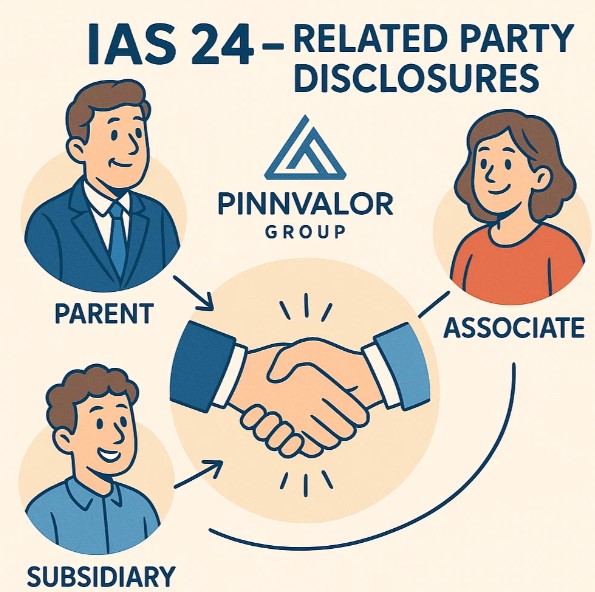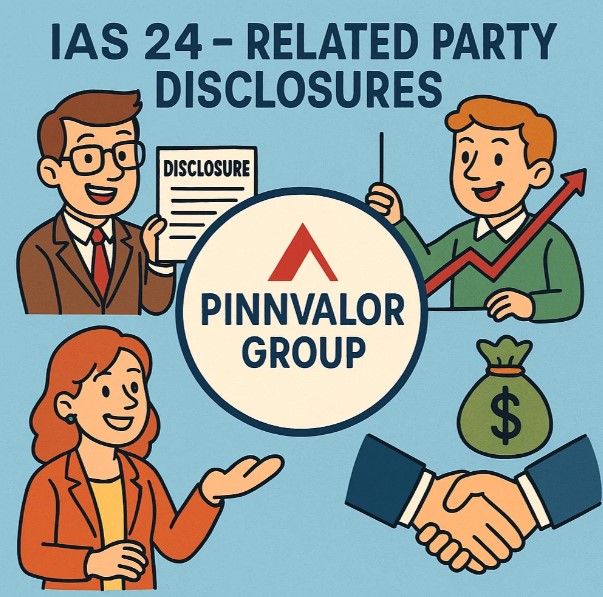
IAS 24 – Related Party Disclosures
In the realm of financial reporting, objectivity and transparency are critical. One key area where these principles are at risk is in related party transactions—deals and relationships that, while potentially legitimate, may be used to obscure financial realities or benefit insiders.
To address this, the International Accounting Standards Board (IASB) issued IAS 24 – Related Party Disclosures, which is a crucial part of the International Financial Reporting Standards (IFRS) framework. IAS 24 ensures that users of financial statements are provided with a full picture of related party relationships and their impact on the financial statements.
Related party transactions can shape financial outcomes, but only through clear, honest disclosures can you ensure they reflect true business practices.
🎯 Objective of IAS 24
The main objective of IAS 24 is:
“To ensure that an entity’s financial statements contain the disclosures necessary to draw attention to the possibility that its financial position and profit or loss may have been affected by the existence of related parties and by transactions and outstanding balances with such parties.”
In simpler terms, transparency is the goal—if a transaction or relationship could influence financial performance or decisions, it must be disclosed.
🔍 What is a Related Party?
IAS 24 defines a Related Party as:
1. Related Party – Person
A person (or close family member) is related to a reporting entity if they:
- Have control or joint control over the reporting entity
- Have significant influence over the reporting entity
- Are a key management personnel (KMP) of the reporting entity or its parent
2. Related Party – Entity
An entity is related to a reporting entity if:
- Both are part of the same group (i.e., a parent and subsidiaries)
- One entity is an associate or joint venture of the other
- Both entities are joint ventures of the same third party
- The entity is controlled or jointly controlled by a person identified as a related person
- The entity provides KMP services to the reporting entity
🔸 Close Family Members
- Spouse or domestic partner
- Children and their spouses or partners
- Dependents of the individual or their partner
🧾 Examples of Related Party Transactions
- Sales or purchases of goods and services
- Transfers under finance arrangements (loans, guarantees)
- Leases
- Transfers of R&D, licenses, or intangible assets
- Management contracts and remuneration
Even non-monetary transactions or agreements without compensation may fall under related party disclosure.
📋 Disclosure Requirements Under IAS 24
An entity must disclose:
1. Nature of the Related Party Relationship
Even if there are no transactions, the existence of a parent-subsidiary relationship must be disclosed.
2. Key Management Personnel (KMP) Compensation
Disclose total compensation, split into categories:
- Short-term benefits (e.g., salaries, bonuses)
- Post-employment benefits (e.g., pensions)
- Other long-term benefits
- Termination benefits
- Share-based payments
3. Related Party Transactions
For each category of related party:
- Description of the transaction
- Amount of the transaction
- Outstanding balances (receivables/payables)
- Terms and conditions (e.g., interest, guarantees)
- Any provisions for doubtful debts
🛑 Disclosure Exemptions
Government-Related Entities:
If the reporting entity and the related party are both controlled, jointly controlled, or significantly influenced by the same government, the disclosure can be limited.
However, disclosure is still required if:
- The transactions are significant or non-arm’s length
- The type of transaction is unusual

⚖️ Importance of IAS 24 in Financial Reporting
- Enhances Transparency: Investors and regulators can better assess risk when relationships and transactions are clearly outlined.
- Promotes Accountability: Discourages the use of related party arrangements to manipulate earnings or hide liabilities.
- Supports Better Governance: Strengthens oversight through disclosure of KMP compensation and inter-entity dealings.
📊 IAS 24 vs Ind AS 24 (India-Specific Note)
The Indian Accounting Standard Ind AS 24 is aligned with IAS 24 but includes additional provisions to comply with Indian corporate governance laws, such as:
- More detailed identification of related parties under the Companies Act, 2013
- Mandatory disclosures for Indian subsidiaries and associates even when materiality is low
📝 Best Practices for Compliance
- Maintain an updated related party register
- Train accounting and legal teams to identify and track transactions
- Establish internal controls over approval of related party dealings
- Include clear explanations of terms in disclosures—not just amounts
🔚 Conclusion
IAS 24 – Related Party Disclosures is essential for fostering trust in financial statements. It ensures stakeholders have access to information about relationships that could influence financial results. While related party transactions are not inherently problematic, transparency and fairness in their reporting are non-negotiable in the world of ethical finance.
By applying IAS 24 consistently and thoroughly, entities can uphold strong governance standards, ensure regulatory compliance, and build investor confidence.
